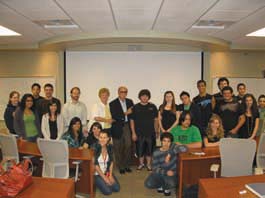Mari Koshkakaryan
Staff Writer

Tom Mooradian, author of The Repatriate: Love, Basketball, and the KGB, was invited by the Armenian Studies Program to give a lecture to students at Fresno State on Friday, October 16.
During his senior year in Southwestern High School in Detroit, Tom Mooradian was recognized for his high academic achievements, his amazing basketball talents, and for his bright future. Upon graduating in 1947, Mooradian joined a group of repatriates and headed to Soviet Armenia, where he completed his Bachelors Degree at the Institute of Physical Culture and Sport and later shared his basketball talents as a coach. He was recognized as an incomparable basketball athlete in Soviet Armenia. Soon after arriving in Soviet Armenia, Mooradian felt the need to return back home to the United States. However, he soon discovered that returning was not going to be as easy as he had been made to believe. When he joined the American repatriates, Mooradian was told he could easily return to his homeland as desired, but he felt no such freedom. “They told me that if you don’t like it, you can go back. Not true. I couldn’t go back until 1960,” said Mooradian.
Mooradian continued to share and describe the lifestyle he lived in Soviet Armenia during the time of Soviet rule—the fear and lack of freedom that he was not accustomed to for someone that came from the US, a country known for its freedom. He described his stay in Batumi (a port in southern part of Georgia) as filthy, with no water and food. The conditions were unbearable and he was glad to have not spent more than one week there. He continued on to Yerevan, where he described his stay in apartments that were already falling apart. Everything was being destroyed under Soviet rule.
Mooradian was not the only United States resident that experienced that lifestyle during Soviet rule.
“Americans were upset,” said Mooradian. He recalled a night in Yerevan when he woke up from screams and chaos happening outside his apartment and as he stared from the window he saw people being put behind trucks and taken away. He wanted to go down and see what was happening, but he was fortunate to have been stopped from one of his group members.
“My friend stopped me from going down. He said if I was lucky, they would kill me and if not, I would be put in a truck and would have disappeared,” said Mooradian.
Although he “felt that he was a coward” to not have stepped down and confronted the Soviet Union leaders, he did the right thing as his life would have been jeopardized. He described how people lived in fear—the fear from saying the wrong thing in public and being punished by the Soviet government. No one was allowed to speak against the Soviet government—if they did they would soon disappear.
He described how students were killed for speaking out during Soviet rule. He shared a story of his encounter with a friend, Svetlana, who was seen crying because she discovered that her classmates were no longer going to be joining her. She went to school one day and saw two empty chairs and her teacher said that her friends were not part of the country and that he wasted his time teaching them.
Unable to continue living in such a harsh and terrifying society, Mooradian decided to write a petition to Moscow to at least let the poor children escape the horrible conditions of the Soviet Union. Having written the petition to the United States ambassador, it was approved. He was finally let go to freely return to his homeland.
Mooradian concluded his powerful, descriptive, and emotional lecture by stating that we should feel good for being American. Americans have the freedom to move from one place to another without the fear of being tortured or killed by the Soviet government.
“I love this country. Although I enjoyed the Soviet people, the government was something else,” said Mooradian. Mooradian sent out the message through his lecture that the liberty and freedom that comes from being American and living in the United States should not be taken for granted.
Mooradian shares more in depth his experiences living in Soviet Armenia in his book The Repatriate: Love, Basketball, and the KGB. This book is not simply facts from history of how life was during Soviet rule, but is based on his true experiences—an American-Armenian who journeyed to Soviet Armenia, where what he hoped for turned into a nightmare and from where he could not easily escape.
 Hye Sharzhoom Armenian Action
Hye Sharzhoom Armenian Action